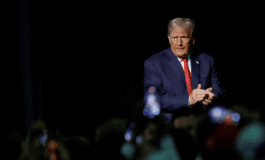
Washington — Members of the press, bloggers and law enforcement officials could request a free copy of a special 200 page report on the American Israel Public Affairs Committee (AIPAC) during the annual AIPAC Policy Conference held this week in Washington, DC.
“Foreign Agents: The American Israel Public Affairs Committee from the 1963 Fulbright Hearings to the 2005 Espionage Scandal” is an exposé of AIPAC’s encounters with U.S. law enforcement. “Foreign Agents” was produced by the Insitute for Research on Middle East Policy’s (IRmep) Center for Policy and Law Enforcement and asks tough questions about AIPAC and the Foreign Agents Registration Act, U.S. election laws and the 1917 Espionage Act.
It begins with Senator J.W. Fulbright’s 1963 hearings on foreign agents active in the United States. Fulbright discovered $5 million had been laundered into U.S. lobbying and propaganda activities from Israel-based foreign principals. Isaiah L. “Si” Kenen, AIPAC’s founder, received tens of thousands of dollars to write and distribute his lobbying newsletter “The Near East Report.”
The “Near East Report” (NER) is still published today at AIPAC headquarters. During Kenen’s time it excoriated members of the U.S. Congress who rejected Israeli policy mandates. The NER lavished praise on members of mainstream media and “experts” who provided public relations spin on controversial Israeli initiatives. One that NER covered up was Israel’s Dimona nuclear power program which clandestinely produced 150 nuclear weapons in spite of the Non-Proliferation Treaty. “Foreign Agents” reproduces the subpoenaed foreign payment vouchers and internal public relations strategy documents in a groundbreaking analysis. Israeli lobby money prevailed in spite of the Foreign Agents Registration Act, nonproliferation efforts and a Department of Justice investigation.
In the late 1980s U.S.-Israel trade was roughly in balance. In 1984 the U.S. and Israel signed America’s first “free trade agreement.” Between 1989-2006 bilateral trade went from parity to an almost a $50 billion cumulative U.S. deficit with Israel. In 1984 the FBI discovered that AIPAC possessed secret information U.S. companies had supplied to the International Trade Commission, but no criminal charges were pursued.
However two years later a former AIPAC director helped rig the California Senate race by laundering campaign contributions in collusion with a network of cutout campaign donors. The former AIPAC director, Michael Goland, even served a few months of prison time, but the results of the dirty election went unchallenged. AIPAC’s own reputation and power in the U.S. Congress subsequently ballooned.

AIPAC then allegedly coordinated Political Action Committee (PAC) contributions in violation of its nonprofit status in order to promote vetted candidates for Congress and to pick off foes. The Washington Post published the internal AIPAC coordination memos in 1988. “Foreign Agents” analyzes the years of subsequent court actions against AIPAC by concerned U.S. citizens. The case reached the U.S. Supreme Court before fading into oblivion. Did AIPAC transcend U.S. laws?
Finally, “Foreign Agents” provides in-depth analysis of the 2005 criminal indictments lodged against two AIPAC executives for alleged violations of the 1917 Espionage Act. Can this long delayed criminal trial proceed, or will it require a pardon in keeping with standard U.S. law enforcement leniency and special presidential treatment of AIPAC? “Foreign Agents” provides one shocking answer.
Reporters and bloggers can get a hard copy of “Foreign Agents” by sending email to info@IRmep.org. Federal, state and local law enforcement officials may also receive a free copy while supplies last if requested through a government email domain.
Members of the public may purchase “Foreign Agents” for $14.95 at Amazon.com, Barnes & Noble, and many other fine bookstores. The report’s ISBN number is 0-9764437-7-5.
IRmep is a Washington-based nonprofit that studies U.S. policy formulation toward the Middle East. IRmep’s Center for Policy & Law Enforcement studies how warranted enforcement of U.S. laws would improve trade, development, and America’s international standing.





Leave a Reply